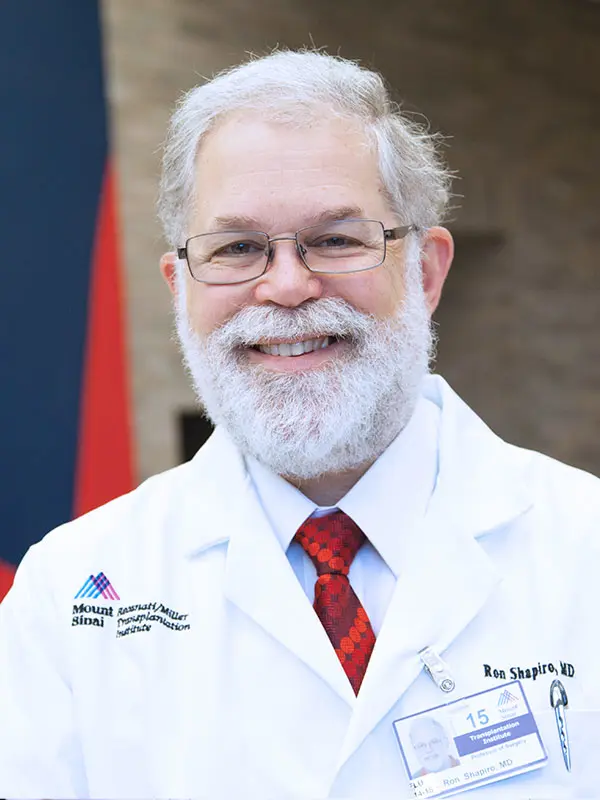The success of Mount Sinai’s kidney transplant program in breaking fresh clinical and scientific ground has been validated by a number of new studies that show one-year patient and graft survival rates in the neighborhood of 95 percent. In areas ranging from transplantation of high-risk patient populations and high-risk organs to innovative programs that expand the living kidney donor pool, the Recanati/Miller Transplantation Institute at the Icahn School of Medicine at Mount Sinai is achieving outcomes in its more than 200 kidney transplants annually that have important implications for the entire field.
“Our program has flourished by serving a vast range of patients in urgent need of kidney transplants, including underrepresented populations that have been rejected by other transplant programs,” says Ron Shapiro, MD, Surgical Director of the Kidney and Pancreas Transplant Program at the Recanati/Miller Transplantation Institute. “The ‘frosting’ on this ongoing work is the many studies we’ve published over the past year that have not just confirmed our success, but encouraged us to continue to push the boundaries of organ transplant.”
No better example exists than the Institute’s leading-edge work with hepatitis C and, more specifically, transplantation of kidneys from donors testing positive for hepatitis C virus (HCV) infection to HCV-positive recipients and, ultimately, to HCV-negative recipients. In a study published in The Journal of Clinical and Translational Research, Dr. Shapiro and his research team found no significant increase in rejection, proteinuria, or changes in immunosuppression in a small group of kidney transplant recipients receiving organs from HCV-positive donors. They concluded that these viable organs can be safely used in HCV-uninfected recipients with good short-term outcomes.
“More than 92,000 patients are awaiting kidney transplantation in this country, and any new mechanism to give these individuals more timely access to a wider organ pool could reduce mortality and improve overall outcomes,” emphasizes Dr. Shapiro, who is also Professor of Surgery at the Icahn School of Medicine. “We believe that maximizing use of HCV-positive organs for HCV-negative recipients could lead to an additional 300 to 500 transplants annually.” Making this expansion possible, he notes, is a new generation of antiviral agents with post-transplantation HCV cure rates exceeding 95 percent and, along with that, a negation of the ill effects of HCV previously seen in kidney transplant recipients.
“We believe that maximizing use of HCV-positive organs for HCV-negative recipients could lead to an additional 300 to 500 transplants annually.”
Ron Shapiro, MD
Mount Sinai researchers have also addressed concerns over the safety and advisability of proceeding with kidney transplantation in the midst of a global pandemic. The Recanati/Miller Transplantation Institute studied 30 kidney transplants performed at the height of the COVID-19 outbreak in the New York metropolitan region, and found after a median follow-up of 51 days that more than 93 percent of those patients were alive, with 100 percent allograft survival. The study, published in Clinical Transplantation, reported that kidney transplantation using standard induction and maintenance immunosuppression appeared to be associated with only a modest risk of severe COVID-19-related disease. Specifically, the team reported that of the nine patients readmitted to the hospital during the study, three of the four cases related to COVID-19 infections were considered mild.
Another Mount Sinai-initiated program that’s helping to broaden the pool of living kidney donors—whose organs have twice the longevity of those of a deceased donor—is known as Kidney Coach. This effort was born of the knowledge that candidates in need of a kidney find it extremely difficult to broach the subject with people in their own social networks. What would happen, though, if someone close to the patient but unable to donate was trained as a kidney coach to reach out to the family and the community as an advocate in search of a potential donor? The Institute decided to find out, and learned from a study that appeared in Clinical Transplantation that 80 percent of 20 candidates in its patient cohort had at least one donor inquiry, compared to 38 percent in the control group.
“The effectiveness of the Kidney Coach Program has made it a routine part of our living donor program at the Institute,” asserts Dr. Shapiro. “At the same time, we’ve reached out to other hospitals in the New York area to encourage them to develop similar programs that can successfully find individuals willing and able to donate.”
Featured

Ron Shapiro
Professor of Surgery
